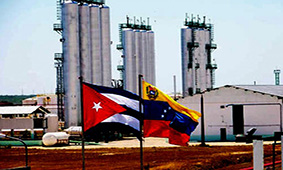
Cuba refinery runs jump on Venezuelan crude supply

The 65,000 b/d state-owned Cienfuegos refinery will process an average 37,120 b/d in 2018, 54.6pc more than in 2017, according to a Cuban government statement and state-owned oil company Cupet.
The refinery is projected to boost throughput by another 28pc-31pc in 2019, Cupet said.
The refinery processed 3,800 b/d more in the first nine months of 2018 than it did in the 2017 period, and all the facility's production lines are operating, yielding LPG, gasoline, aviation fuel, kerosene and diesel, the statement said.
The increased processing at the Soviet-era refinery reflects the delivery of higher volumes of Venezuelan Mesa crude, the refinery's manager Hermenegildo Montalvo Ibarra said in the statement.
The refinery runs will continue to grow in 2019 as "more feedstock is expected from several sources," Cupet told Argus.
Venezuelan state-owned oil company PdV produces 30.5° API Mesa grade from its eastern division fields, such as Carito and Pirital.
A PdV executive tells Argus that the shipments to Cuba are sometimes topped off with 16°API Merey blend as well.
In recent months, PdV internal data showed that Cuba received 50,000 b/d of off-balance sheet Venezuelan oil, representing up to 5pc of the Opec country´s oil exports.
The oil shipments to Cuba are effectively sold for free under a longstanding state-to-state agreement between Caracas and Havana.
Throughput at Cienfuegos had been declining since at least 2015, when PdV started cutting back on more than 100,000 b/d of supply to the island because of falling domestic production and oil-backed commitments to China and Russia.
Cienfuegos processed an average 24,000 b/d in 2017 because of the shortfall in Venezuelan crude supplies, the Cuban government said in December.
Cuba has been "steadily" increasing oil imports since April, easing a fuel shortage and boosting production at the refinery, Cupet said last month.
But the island still needs another 18,000 b/d to meet demand of 160,000 b/d and to stabilize the energy sector, the company said. In March 2018, Cupet said the deficit was "about 26,000 b/d", and earlier, in December 2017, pegged the deficit at 30,000 b/d.
The increased imports that are closing the deficit are coming from "several new and traditional" sources, and are managed by the foreign trade ministry, the official said.
Cuba still lacks sufficient gasoline and fuel oil for power generation, causing frequent blackouts. The government is ensuring adequate supplies of some products such as LPG, which is the island's main fuel for cooking.
Havana said in January 2018 it planned to take delivery of unspecified volumes of crude and products from Algeria's state-owned Sonatrach in 2019-21.
Cuba has also imported some crude and products from Iran, Angola and Trinidad and Tobago, to compensate for the reduced Venezuelan supplies, Cupet said in March.
In October 2017, the Cuban government said Cupet was in supply discussions with Russian state-controlled Rosneft, and the company's potential involvement in the upgrading and expansion of Cienfuegos. Cupet declined to comment on the talks with Rosneft.
The refinery had been operated by a Cupet joint venture with PdV known as Cuvenpetrol. But Cupet quietly took over PdV´s 49pc stake in August 2017.


Trump weighs using $2 billion in CHIPS Act funding for critical minerals

Codelco cuts 2025 copper forecast after El Teniente mine collapse

Electra converts debt, launches $30M raise to jumpstart stalled cobalt refinery

Barrick’s Reko Diq in line for $410M ADB backing

Abcourt readies Sleeping Giant mill to pour first gold since 2014

Nevada army depot to serve as base for first US strategic minerals stockpile

SQM boosts lithium supply plans as prices flick higher

Viridis unveils 200Mt initial reserve for Brazil rare earth project

Tailings could meet much of US critical mineral demand – study

Kyrgyzstan kicks off underground gold mining at Kumtor

Kyrgyzstan kicks off underground gold mining at Kumtor

KoBold Metals granted lithium exploration rights in Congo

Freeport Indonesia to wrap up Gresik plant repairs by early September

Energy Fuels soars on Vulcan Elements partnership

Northern Dynasty sticks to proposal in battle to lift Pebble mine veto

Giustra-backed mining firm teams up with informal miners in Colombia

Critical Metals signs agreement to supply rare earth to US government-funded facility

China extends rare earth controls to imported material

Galan Lithium proceeds with $13M financing for Argentina project

Kyrgyzstan kicks off underground gold mining at Kumtor

Freeport Indonesia to wrap up Gresik plant repairs by early September

Energy Fuels soars on Vulcan Elements partnership

Northern Dynasty sticks to proposal in battle to lift Pebble mine veto

Giustra-backed mining firm teams up with informal miners in Colombia

Critical Metals signs agreement to supply rare earth to US government-funded facility

China extends rare earth controls to imported material

Galan Lithium proceeds with $13M financing for Argentina project

Silver price touches $39 as market weighs rate cut outlook

















